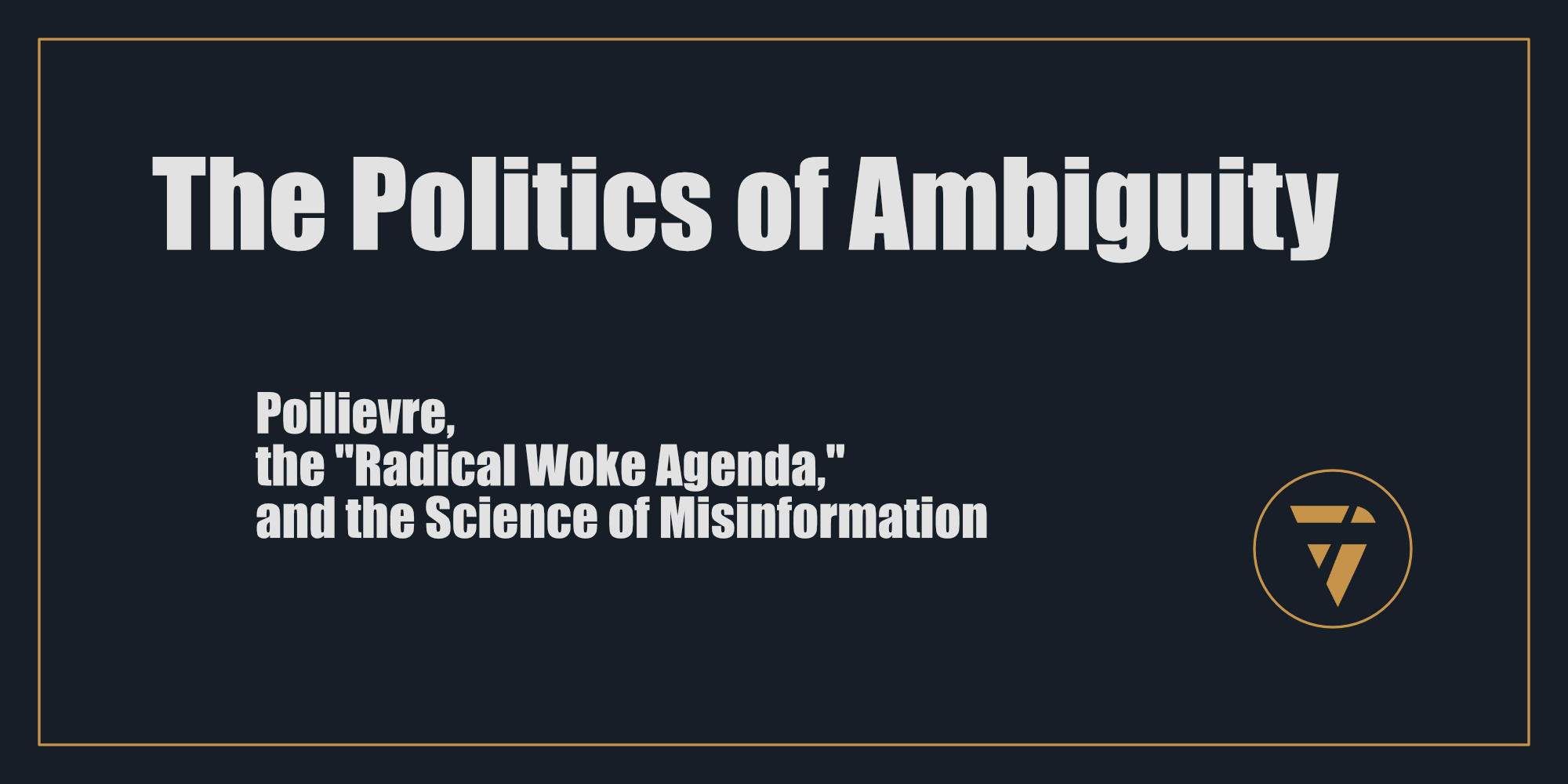The Politics of Ambiguity

Poilievre, the "Radical Woke Agenda," and the Science of Misinformation
Pierre Poilievre is not just a politician; he is a master of narrative warfare. His use of the phrase “radical woke agenda” is not a policy statement—it's a calculated linguistic weapon. It's vague enough to mean everything and nothing at the same time, allowing his supporters to project their frustrations onto it, while shielding himself from accountability. It's a textbook case of how modern politicians deploy misinformation and behavioural science to manipulate public discourse, solidify their base, and sidestep substantive debate.
The Power of an Undefined Enemy
Political history is littered with examples of vague but emotionally charged phrases used to create an enemy. In the McCarthy era, it was “communism.” In the post-9/11 world, it was “terrorism.” Today, in certain conservative circles, it's “woke.” But what does “woke” mean? More importantly, what does Poilievre mean when he adds the words “radical” and “agenda” to the mix?
The term “woke” originally referred to being aware of social injustices, particularly racism, but in recent years, conservatives have co-opted it as a catch-all insult for progressive policies, cultural change, and political correctness. By adding “radical” and “agenda,” Poilievre elevates it from mere irritation to a shadowy, orchestrated threat. The phrase suggests that not only is "woke" bad, but that it's a deliberate, co-ordinated movement imposing extreme changes on unwilling Canadians.
The brilliance of this strategy lies in its vagueness. Unlike a specific policy stance, which can be debated, fact-checked, and legislated, an undefined term like “radical woke agenda” can be constantly reshaped to suit the needs of the moment. It can mean drag storytime hours for one audience, carbon taxes for another, and online speech regulations for yet another. The phrase allows Poilievre to unite a coalition of grievances, without actually committing to a coherent policy agenda.
Misinformation and the “Illusion of Truth”
Poilievre’s rhetorical strategy isn't just about ambiguity; it's about repetition. In behavioural science, the illusory truth effect describes how people are more likely to believe something simply because they hear it often. By continuously framing his opposition as pushing a “radical woke agenda,” Poilievre implants the phrase into public consciousness. Over time, people begin to accept it as fact—even if they struggle to define it.
He also exploits the availability heuristic, a cognitive bias where people judge the frequency or severity of an issue based on how easily they can recall examples. By constantly referring to the “radical woke agenda” without specifics, Poilievre primes his audience to fit news stories into that narrative. If a school updates its gender policy, it becomes proof of the “radical woke agenda.” If a bank runs a diversity initiative, it's more evidence. By never defining the phrase, Poilievre ensures that any cultural change or progressive policy can be slotted into the category.
The Strategic Use of Outrage and Identity Politics
Poilievre’s campaign is built on identity politics of grievance. While he and his supporters often accuse progressives of dividing people along racial or gender lines, his own messaging thrives on division—just in a different way. His rhetoric taps into the fears and frustrations of voters who feel left behind by social change, positioning them as the “real Canadians” under siege from an out-of-touch elite.
Neuroscientific studies show that outrage is one of the most powerful drivers of political engagement. When people feel threatened or attacked, they become more politically active, more tribal, and less likely to engage with opposing viewpoints. Poilievre’s use of the “radical woke agenda” serves to keep his base in a constant state of outrage, ensuring high engagement and deep loyalty.
This tactic is particularly effective in the age of social media, where algorithms amplify emotionally charged content. Poilievre’s clips attacking the “radical woke agenda” perform well on platforms like Twitter and Facebook, not because they offer solutions, but because they generate anger and reaction. He is not trying to solve problems—he is trying to make people feel under siege.
A Moving Target: The Flexibility of Misinformation
One of the hallmarks of misinformation is its adaptability. The genius of Poilievre’s strategy is that the “radical woke agenda” is a constantly shifting target. When one fear fades from public consciousness, another can take its place.
- If opposition to gender-inclusive language starts losing traction, the radical woke agenda can suddenly become about government control over speech.
- If carbon taxes become less controversial, then the radical woke agenda is now about DEI hiring.
- If conservatives stop caring about diversity training, then the radical woke agenda shifts to internet censorship.
This flexibility allows Poilievre to sustain outrage indefinitely, always offering his supporters a new enemy, a new reason to feel aggrieved.
The Absence of Policy: A Strategy of Obstruction, Not Governance
The greatest trick of the “radical woke agenda” is that it obscures the fact that Poilievre himself has little in the way of an actual governing vision. By framing himself as the fighter against an undefined enemy, he avoids offering real solutions.
Consider his press conference where he vowed to “end the radical woke agenda.” What did he propose to do? Nothing concrete. He did not list the specific policies he would repeal, the laws he would introduce, or the measurable outcomes he wanted to achieve. Instead, he simply repeated the phrase as though saying it enough times would create a policy platform.
This is the political equivalent of running against a monster in the dark. If he turned on the lights and showed people what he was actually talking about, they might realize the monster isn't real—or that they don't all agree on what it looks like.
Who Benefits from the “Radical Woke Agenda” Narrative?
At its core, Poilievre’s rhetoric serves a political class that thrives on division. The real beneficiaries of this narrative are not working-class Canadians struggling with affordability but the political machine that profits from their anger. By keeping voters distracted with a nebulous culture war, Poilievre ensures that structural economic issues—corporate monopolies, wealth inequality, real estate speculation—remain secondary in political discourse.
His brand of populism claims to fight for the common person, but in reality, it directs their frustrations toward cultural enemies rather than systemic economic issues. The result? A political landscape where people are angry at inclusive language in government forms but not at corporate tax avoidance. Where they feel more threatened by drag queens reading to children than by billionaires driving up housing prices.
A Manufactured Crisis for Political Gain
Poilievre’s use of the “radical woke agenda” is not an accident—it's a strategic, scientifically backed method of manipulating public discourse. It exploits cognitive biases, fuels misinformation, and keeps voters engaged through outrage rather than substantive policy solutions.
By refusing to define the term, he ensures that it remains useful as a perpetual boogeyman, adaptable to whatever cultural grievance is most politically expedient. His supporters hear what they want to hear, his critics are left arguing over definitions rather than policies, and real political discourse is buried under an avalanche of empty rhetoric.
If Poilievre truly intends to “end the radical woke agenda,” he first needs to define what it is. Until then, his words remain nothing more than an exercise in political theatre—one that serves his career far more than it serves Canadians.
This is what I’m working on. Tell me what you think, I enjoy the conversation! Subscribe and follow the work in real time.
Thanks!
B

Poilievre vows to end the 'radical woke agenda'—but what is it? He won’t say. That’s the point. Keep it vague, fuel the outrage, and let supporters fill in the blanks. It’s not a policy, it’s a marketing strategy. Politics as vibes, not solutions. Manipulation, coercion, and social terrorism.
PS -






